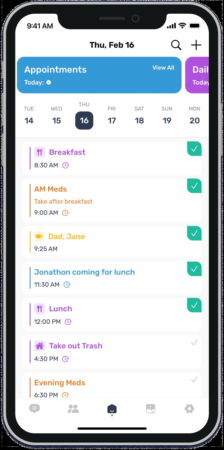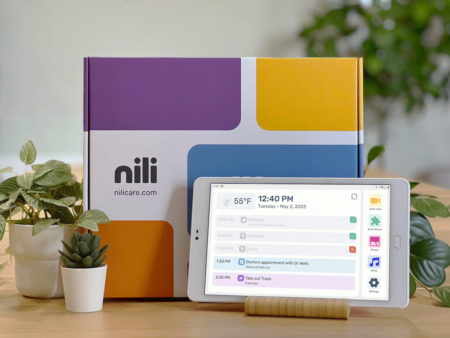Just in time for the Holidays and to start the New Year, Ashkan Vaziri, PhD, Founder and CEO of BioSensics LLC, writes to share good news about the outcome of a $3,000,000 National Institutes of Health grant his company received. BioSensics developed a digital solution for older adults and caregivers.
Guest Article by Dr. Ashkan Vaziri
Nili Care
The solution, called Nili, is designed to lower the burden of caregiving while promoting happier, healthier aging. Nili is a care coordination platform comprised of a Nili Companion Tablet and the Nili Mobile App, available to caregivers using either iPhone or Android smartphones.
As the number of Americans who are choosing to age in place continues to rise, many families are seeking innovative solutions to help monitor the health and well-being of their elderly loved ones. With the help of advanced technology, it has become possible to remotely stay connected, monitor medication schedules, and even detect signs of potential health risks before they become serious. As a result, families are able to provide better care for their loved ones without having to rely solely on in-person visits or traditional healthcare providers.

Nili supports the needs of seniors living independently while minimizing the burden of caregiving. Through an engaging tablet companion, Nili enables aging-in-place and activities of daily living management for older adults, including individuals with dementia. Using the Nili Mobile Application, multiple care partners can collaborate on managing and coordinating the care of their loved ones.
Nili was designed to revolutionize the caregiving landscape and empower care partners nationwide. The platform was developed by BioSensics, a leader in developing wearable sensors and digital health technologies in collaboration with Baylor College of Medicine and supported with over $3 million from the National Institute of Aging (NIA), NIH.
Staying Connected
As people age, staying connected with loved ones becomes increasingly essential. With the help of the Nili Companion Tablet, older adults can easily keep in touch with family members through secure video calls, sharing photos, and even engaging in personalized brain games and music listening. Not only does this technology provide a means for social connection, but it also promotes independent living and mental stimulation. Nili allows for a seamless and user-friendly experience, making it accessible for older adults to engage with technology and stay connected with their loved ones.
The home page of the Nili Companion Tablet focuses on daily reminders for medications, meals, appointments, and other essential activities of daily living. Notification alerts can be set to be read aloud at the time of the scheduled event, and, in the case of extra important events, push notifications can be set to alert caregivers if a critical medication or appointment is missed.
Trusted caregivers can be securely added to the care group and, from the app, can then remotely schedule, monitor, and manage the daily activities of the person they’re caring for. Care partners can also connect with the older adult, share photos instantly with them, communicate with each other, and treat Nili as a dedicated hub to share caregiver information.
Clinical Study

In collaboration with Baylor College of Medicine, an initial clinical study was conducted to gain a better understanding of the needs and comfort level of older adults with mild cognitive impairment while using new technology. The study delved into various aspects such as the ease of use of the technology and the level of support required by the participants.
Based on the feedback received from the study participants, the interface design was modified to make it extremely user-friendly and easy to navigate for those who are not technologically savvy. The design incorporated various features such as simple and intuitive icons, large fonts, and clear instructions to ensure that the participants could easily use the technology without any assistance.
The clinical study identified challenges faced by older adults with mild cognitive impairment when using new technology. The feedback obtained helped to improve the design of the interface, making it more accessible and user-friendly for those who are not well-versed in technology.
BioSensics is a leader in developing wearable sensors and digital health technologies for clinical trials, remote patient monitoring, and health assessments. Founded in 2007 by three scientists from Harvard, BioSensics has created new paradigms in using wearable sensors in healthcare and revolutionized the medical alert industry by developing technologies that are now being used by thousands of older adults.








